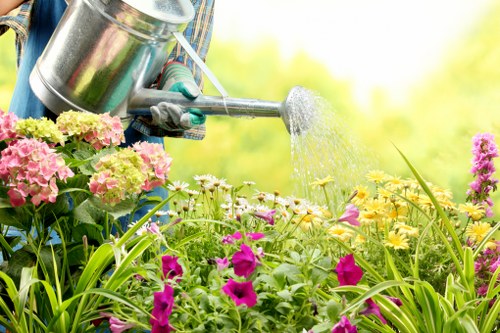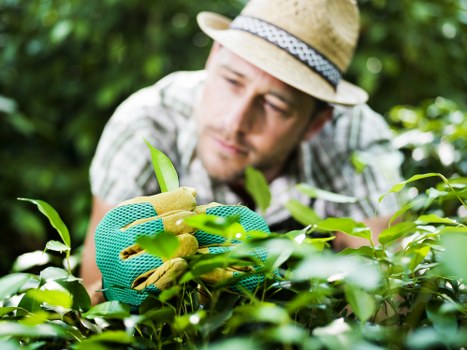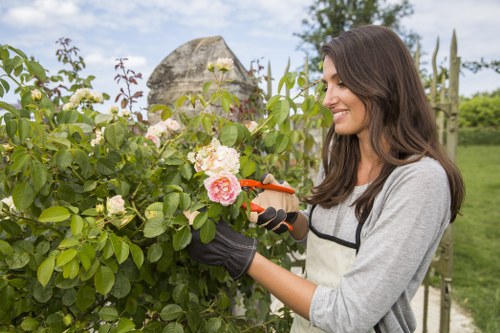Expert Garden Maintenance in Bethnal Green

Introduction to Garden Maintenance
Maintaining a beautiful garden in Bethnal Green requires dedication, knowledge, and the right tools. Whether you have a sprawling backyard or a cozy balcony garden, proper maintenance ensures your plants thrive and your outdoor space remains inviting throughout the year.
Garden maintenance involves various tasks, including pruning, weeding, watering, and fertilizing. Each of these tasks plays a crucial role in the health and aesthetics of your garden. Understanding the specific needs of your plants and the unique climate of Bethnal Green can make a significant difference in achieving a lush and vibrant garden.
In this article, we will explore essential garden maintenance tips tailored for residents of Bethnal Green. From seasonal tasks to choosing the right plants, you'll find everything you need to keep your garden in top shape.

Seasonal Garden Maintenance
Spring Maintenance
Spring is a critical time for garden maintenance in Bethnal Green. As the weather warms up, it's essential to prepare your garden for the growing season.
Key Spring Tasks:
- Pruning: Trim back any dead or overgrown branches to encourage healthy growth.
- Weeding: Remove weeds that have taken root over the winter to reduce competition for nutrients.
- Soil Preparation: Enrich the soil with compost or organic matter to provide a nutrient-rich environment for your plants.
Starting your garden maintenance in spring sets a strong foundation for the rest of the year, ensuring your plants have the best possible conditions to flourish.

Essential Tools for Garden Maintenance
Basic Gardening Tools
Equipping yourself with the right tools is fundamental for effective garden maintenance. Here are some essential tools every gardener in Bethnal Green should have:
- Pruners: For trimming and shaping plants.
- Garden Fork: Useful for turning soil and removing weeds.
- Watering Can: Essential for providing adequate moisture to your plants.
Investing in quality tools not only makes garden maintenance easier but also ensures better care for your plants.

Choosing the Right Plants
Climate Considerations
Bethnal Green's climate has a significant impact on the types of plants that will thrive in your garden. Selecting plants that are well-suited to the local conditions can reduce maintenance efforts and increase the likelihood of a thriving garden.
- Perennials: These plants come back year after year, requiring less replanting.
- Native Plants: Native species are adapted to the local climate and soil, making them more resilient.
- Drought-Tolerant Plants: Ideal for reducing the need for frequent watering.
By choosing the right plants, you can create a sustainable garden that requires minimal upkeep while still providing beauty and interest.

Watering and Irrigation
Efficient Watering Techniques
Proper watering is crucial for the health of your garden. Overwatering can lead to root rot, while under-watering can cause plants to wilt and die.
Tips for Efficient Watering:
- Early Morning Watering: Watering in the early morning reduces evaporation and allows plants to absorb moisture before the heat of the day.
- Drip Irrigation: A drip system delivers water directly to the plant's roots, conserving water and minimizing waste.
- Mulching: Applying mulch helps retain soil moisture and suppresses weed growth.
Implementing efficient watering techniques ensures your garden stays hydrated without wasting water, which is both environmentally friendly and cost-effective.

Pest and Disease Management
Identifying Common Pests
Garden pests can pose a significant threat to the health of your plants. Identifying and managing these pests promptly is essential to prevent widespread damage.
- Aphids: Small insects that suck the sap from plants, causing deformation and stunted growth.
- Slugs and Snails: These pests feed on leaves and stems, leaving unsightly holes.
- Spider Mites: Tiny pests that cause discoloration and can lead to plant death if left unchecked.
Regularly inspecting your plants and taking immediate action at the first sign of pests can help maintain the health and beauty of your garden.

Lawn Care and Maintenance
Maintaining a Healthy Lawn
A well-maintained lawn enhances the overall appearance of your garden. Proper lawn care involves mowing, fertilizing, aerating, and overseeding.
- Mowing: Regular mowing at the correct height encourages dense and healthy grass growth.
- Fertilizing: Applying the right fertilizer provides essential nutrients to your lawn.
- Aerating: Aerating the soil improves water and nutrient absorption.
Consistent lawn care practices ensure your lawn remains green, lush, and resilient against pests and diseases.

Pruning and Trimming
Techniques for Effective Pruning
Pruning is essential for maintaining the shape and health of your plants. Proper pruning techniques can promote better growth and enhance the aesthetic appeal of your garden.
- Remove Dead Wood: Eliminate any dead or diseased branches to prevent the spread of infection.
- Shape Plants: Trim branches to maintain the desired shape and size of your plants.
- Encourage Growth: Pruning can stimulate new growth and increase airflow around your plants.
Regular pruning not only keeps your garden looking tidy but also contributes to the overall health and longevity of your plants.

Soil Health and Fertilization
Improving Soil Quality
Healthy soil is the foundation of a thriving garden. Enhancing soil quality involves testing, amending, and maintaining the right balance of nutrients.
- Soil Testing: Determine the pH and nutrient levels to tailor your soil amendments effectively.
- Adding Organic Matter: Incorporate compost or well-rotted manure to improve soil structure and fertility.
- Balanced Fertilization: Use fertilizers that provide essential nutrients without overloading the soil.
Maintaining healthy soil ensures that your plants have access to the necessary nutrients for optimal growth and resilience.

Seasonal Garden Adjustments
Preparing for Winter
As the seasons change, so do the maintenance needs of your garden. Preparing for winter ensures that your plants survive the colder months and are ready to thrive come spring.
- Protecting Plants: Use mulch or protective coverings to shield plants from frost and freezing temperatures.
- Clearing Debris: Remove fallen leaves and dead plants to prevent disease and pest infestation.
- Tool Maintenance: Clean and store your garden tools properly to extend their lifespan.
Proactive seasonal adjustments help maintain the integrity of your garden year-round, minimizing damage from adverse weather conditions.
Conclusion
Effective garden maintenance in Bethnal Green involves a combination of regular care, the right tools, and an understanding of local conditions. By following the tips outlined in this article, you can ensure that your garden remains a beautiful and thriving space throughout the year.
Ready to transform your garden? Contact us today to book your garden maintenance service and let our experts help you achieve the garden of your dreams.

